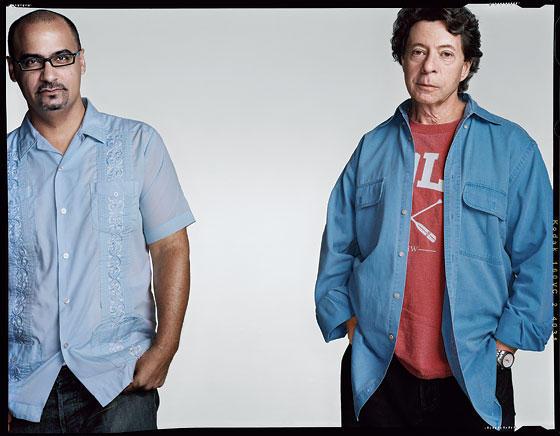 |
Junot Díaz and Richard Price
(Photo: Dan Winters) |
Richard Price and Junot Díaz are having a very nice year. Díaz’s first novel, The Brief Wondrous Life of Oscar Wao, won the Pulitzer Prize; Price’s eighth, Lush Life, got some of the best reviews of his career. (He says he feels like “an overnight sensation 35 years in the making.”) Although their backgrounds are quite different—Price, born in 1949, grew up in a Bronx housing project; Díaz, born in 1968, grew up in the Dominican Republic and moved to New Jersey when he was 6—they have more in common than one might imagine. Both had cabdriver fathers; both studied at Cornell; both are obsessed with the metaphysics of Jersey. Most of all, they both like to, as Díaz puts it, “sit in voices.” Their work seems unusually determined to capture the rhythms of actual speech as it emerges from the pressures of urban life. And in person, they speak to a remarkable degree in the voices of their novels: Price cracking wise in a heavy Bronx accent, quoting the koans of drug dealers (“Money’s no expense, I keep my ear to the grindstone”); Díaz stitching together intellectualisms, hip-hop slang, and omnivorous cultural references while cursing like a sailor.
Junot Díaz: When I arrived in New York, in 1994, it was the golden era of the Dominican community in Washington Heights. Finally people had established themselves. There were enough people who could speak English, who were, like, multicultural, who’d been to college. And it was such a weird thing to have your community coming into its own at the same time that New York City was in some ways being transformed into a fucking playground. We were coming of age on limited time. All the cards were on the table, but no one could see it yet. We didn’t know that Washington Heights was going to be sold out from under us. About 2000, 2001, was when we starting realizing it.
Richard Price: What was it changing to?
JD: They were moving families out and putting, like, one person in an apartment.
RP: That happened on the Lower East Side too. I remember getting lost there in the eighties, and it was the only time in New York I ever felt scared. All of sudden I’m on Eldridge Street, or Orchard, and people were lined around the block to score heroin from an apartment. There was, like, a brick missing, and you put the money in the brick and you get a deck of heroin. Line around the block. Today, the same apartment’s probably going for a million and a half. In fact, there’s a billboard on the Lower East Side that says where did all the junkies go? Well, the answer’s “indoors.”
JD: The eighties were an incredibly dark period in Washington Heights for the Dominican community. I mean, just the amount of fucking crime, the amount of drugs.
RP: It was so bad that they actually took the Three-three Precinct and they split it into two precincts. There was just too much to handle.
JD: Yeah, no, my girl talks about it. She was born and raised in the Heights, and she was like, “When we got out of the eighties alive, it was such an exciting period.” It’s like the end of your first year at a new high school. People felt like, Wow, we finally made it through.
New York: Where did you grow up?
JD: As a kid, I lived in Perth Amboy, New Jersey, which is right across from Staten Island. I was living in the neighborhood that abutted the landfill.
RP: Smelled nice, I bet.
JD: Yeah. Smelled nice and …
RP: Drink a lot of tap water?
JD: And the dust from the trucks—beyond just the garbage. I felt that we were as far from the world as you could possibly get. I was so desperate to escape. I would step out of my house, and you would see the Verrazano Bridge. My neighborhood was the first stop on the bus from New York. But every one of my friends acted like the neighborhood was some sort of weird, thuggish Brigadoon, and if they left, it would fucking disappear. I have friends who are still there.
RP: When I was writing Clockers, I spent a lot of time in this housing project in Jersey City called Curries Woods.
JD: Oh, yeah, I know it.
RP: It’s kinda down now. And I was hanging out with this one family that had a bird’s-eye view of what’s-her-face. With the torch and—
NY: The Statue of Liberty?
RP: Yeah. I’m getting really bad—what’s-her-face. These people had the best view of the Statue of Liberty. These kids in the projects. They’d never been to New York City. It was like a hop, skip, and a tunnel. And they’re 15, 16 years old. And I find that’s also true in the boroughs—in the Bronx, Brooklyn, Queens. You got people who live, like, a medieval life, spending their entire lifetime within ten miles or less.

